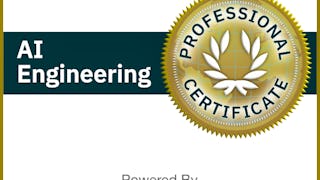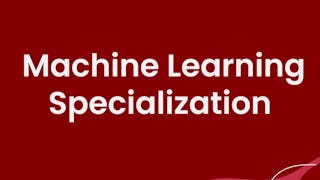Filter by
SubjectRequired
LanguageRequired
The language used throughout the course, in both instruction and assessments.
Learning ProductRequired
LevelRequired
DurationRequired
SkillsRequired
SubtitlesRequired
EducatorRequired
Explore the Unified Modeling Language Course Catalog
 Status: Free Trial
Status: Free TrialDuke University
Skills you'll gain: Debugging, Maintainability, Programming Principles, Algorithms, Software Testing, Program Development, C (Programming Language), Pseudocode, Computational Thinking, Software Engineering, Simulations, System Programming, Data Structures, Software Development, Computer Programming, Command-Line Interface, Operating Systems, Development Environment, User Interface (UI), Data Import/Export
 Status: Free Trial
Status: Free TrialUniversity of California, Irvine
Skills you'll gain: Go (Programming Language), Object Oriented Programming (OOP), Algorithms, JSON, Programming Principles, OS Process Management, Functional Design, Data Structures, Other Programming Languages, System Programming, Development Environment, Software Design, Remote Access Systems, Software Installation, Operating Systems, File Management, Program Development, Computer Architecture
 Status: Free Trial
Status: Free TrialSkills you'll gain: Prompt Engineering, Data Wrangling, Large Language Modeling, Unit Testing, Supervised Learning, Feature Engineering, Generative AI, Keras (Neural Network Library), Deep Learning, Artificial Intelligence, ChatGPT, Natural Language Processing, Data Cleansing, Jupyter, Data Analysis, Unsupervised Learning, Data Manipulation, PyTorch (Machine Learning Library), Data Import/Export, Exploratory Data Analysis
 Status: Free Trial
Status: Free TrialSkills you'll gain: Prompt Engineering, Large Language Modeling, PyTorch (Machine Learning Library), Supervised Learning, Feature Engineering, Generative AI, Keras (Neural Network Library), Deep Learning, Jupyter, Natural Language Processing, Reinforcement Learning, Unsupervised Learning, Scikit Learn (Machine Learning Library), Image Analysis, Data Manipulation, Tensorflow, Python Programming, Verification And Validation, Artificial Neural Networks, Data Processing
 Status: Free Trial
Status: Free TrialKhalifa University
Skills you'll gain: Oral Comprehension, Language Learning, Language Competency, Culture, Vocabulary, Writing, Cultural Diversity, Grammar, Oral Expression, Literacy, Language Interpretation, Translation, and Studies
 Status: Free Trial
Status: Free TrialMultiple educators
Skills you'll gain: Unsupervised Learning, Supervised Learning, Machine Learning Methods, Classification And Regression Tree (CART), Artificial Intelligence and Machine Learning (AI/ML), Applied Machine Learning, Machine Learning Algorithms, Machine Learning, Jupyter, Data Ethics, Decision Tree Learning, Tensorflow, Scikit Learn (Machine Learning Library), Artificial Intelligence, NumPy, Predictive Modeling, Deep Learning, Reinforcement Learning, Random Forest Algorithm, Feature Engineering
 Status: Free Trial
Status: Free TrialSkills you'll gain: Rmarkdown, Ggplot2, R Programming, Data Visualization, Data Analysis, Tidyverse (R Package), Data Visualization Software, Statistical Programming, Data Cleansing, Data Manipulation, Programming Principles, Data Transformation, Integrated Development Environments, Data Structures
 Status: Free Trial
Status: Free TrialSkills you'll gain: Prompt Engineering, HTML and CSS, Software Development Life Cycle, Software Architecture, Large Language Modeling, Unit Testing, Generative AI, Artificial Intelligence, Software Design, ChatGPT, Jupyter, Scrum (Software Development), Software Engineering, Agile Methodology, Bootstrap (Front-End Framework), Web Design, Application Deployment, Automation, Interviewing Skills, Professional Networking
 Status: Free Trial
Status: Free TrialSkills you'll gain: Data Modeling, Database Design, Extract, Transform, Load, Data Warehousing, Performance Tuning, Data Pipelines, Data Integrity, Business Intelligence, Business Process, Data Mart, Data Validation, Statistical Reporting, Data Quality, SQL

University of Michigan
Skills you'll gain: 3D Modeling, Design Elements And Principles, Visualization (Computer Graphics), Computer-Aided Design, Design, Mechanical Design, Architectural Design, Virtual Environment, Creativity
 Status: Free TrialStatus: New AI skills
Status: Free TrialStatus: New AI skillsGoogle
Skills you'll gain: Threat Modeling, Network Security, Threat Management, Incident Response, Vulnerability Management, Computer Security Incident Management, Hardening, Intrusion Detection and Prevention, Cyber Threat Intelligence, Cyber Attacks, Cybersecurity, Network Protocols, Professional Networking, Vulnerability Assessments, Bash (Scripting Language), Operating Systems, Security Controls, Debugging, Interviewing Skills, Python Programming
 Status: Free Trial
Status: Free TrialColumbia University
Skills you'll gain: Portfolio Management, Derivatives, Financial Market, Securities (Finance), Investment Management, Financial Systems, Asset Management, Credit Risk, Actuarial Science, Mortgage Loans, Mathematical Modeling, Mathematics and Mathematical Modeling, Applied Mathematics, Financial Trading, Financial Modeling, Risk Modeling, Regression Analysis, Market Liquidity, Capital Markets, Statistical Methods
In summary, here are 10 of our most popular unified modeling language courses
- Introductory C Programming: Duke University
- Programming with Google Go: University of California, Irvine
- IBM Generative AI Engineering: IBM
- IBM AI Engineering: IBM
- Arabic for Beginners: Khalifa University
- Machine Learning: DeepLearning.AI
- Data Analysis with R Programming: Google
- IBM AI Developer: IBM
- The Path to Insights: Data Models and Pipelines: Google
- Introduction to 3D Modeling: University of Michigan










